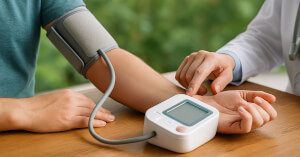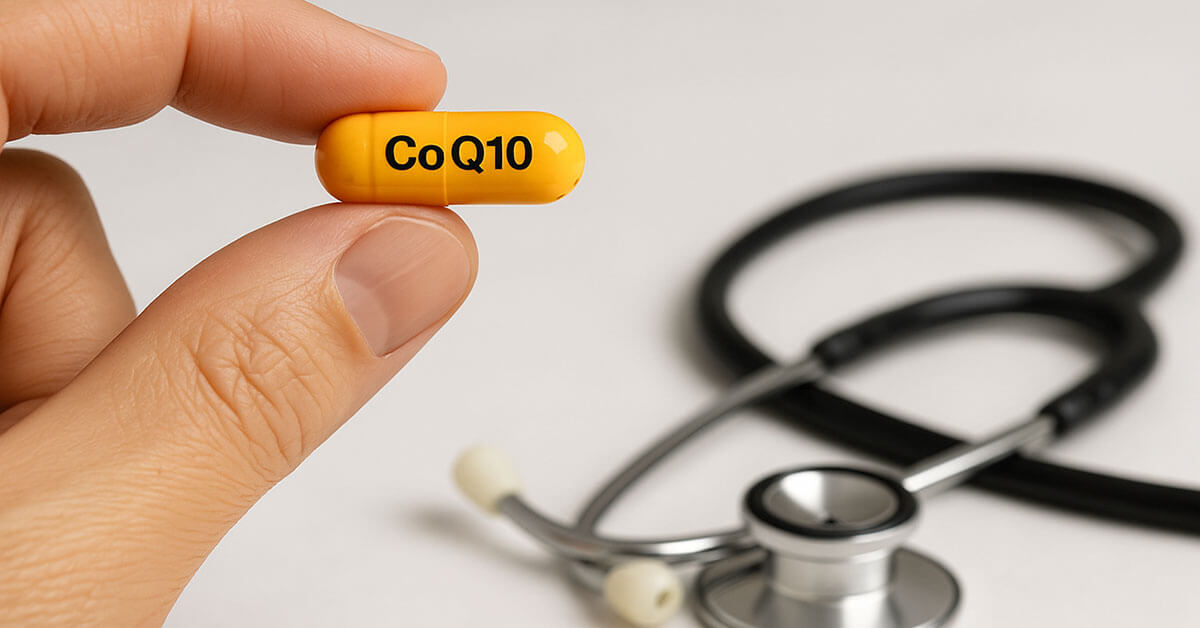
CoQ10 for Heart Health : the supplement everyone should take after 50

After the age of 50, paying attention to our heart health becomes more important than ever. Among the many nutrients people consider, CoQ10 (coenzyme Q10) often stands out. It is a compound your body makes naturally and stores in the cells, especially in the heart, where energy demand is highest.
As we get older, our natural levels of CoQ10 decline, and this decline may leave the heart less resilient. That is why many researchers and doctors see supplementation as a practical way to support cardiovascular health after midlife.
Why CoQ10 Becomes More Important After 50
CoQ10 works inside the mitochondria, the “power plants” of your cells, where it helps make ATP, the fuel that powers muscle contraction. The heart muscle depends heavily on this process since it never stops working. When CoQ10 production falls with age, energy output drops, which can contribute to fatigue and reduced cardiac efficiency.
This decline is even more significant for people who take statins to manage cholesterol. Statins are very effective for lowering LDL cholesterol, but they also block the same pathway the body uses to make CoQ10. As a result, many people over 50 may experience both age-related and medication-related reductions in CoQ10, which is why supplementation is often discussed in this group.
How CoQ10 Supports the Heart
Think of CoQ10 as the helper that keeps the heart’s engine running. It not only drives energy production but also acts as an antioxidant, protecting cardiac tissues from oxidative stress. This dual role, energy and protection, explains why CoQ10 has been studied so extensively for cardiovascular health.
📊 Clinical Evidence: In the Q-SYMBIO randomized trial of patients with chronic heart failure, 300 mg/day of CoQ10 improved symptoms and reduced major adverse cardiovascular events compared with placebo. A European sub-analysis supported consistent benefits across that subgroup (post hoc). Recent reviews also suggest CoQ10 may reduce all-cause mortality and heart failure hospitalizations when used as an adjunct to standard therapy (systematic review).
CoQ10 and Statin Users
Statins lower cholesterol by blocking an enzyme that your body also uses to make CoQ10. Multiple studies show statin use is associated with lower CoQ10 levels in the blood and in cells. Some clinicians suggest CoQ10 to help restore what is reduced with statins, especially if fatigue or muscle aches are present.
📊 Clinical Evidence: Reviews describe a consistent drop in circulating CoQ10 during statin therapy (review). Evidence that CoQ10 relieves statin-associated muscle pain is mixed: some analyses show benefit, others do not (review, mixed findings), (systematic review).
CoQ10 and Blood Pressure
Several trials and meta-analyses suggest CoQ10 can modestly lower systolic blood pressure, especially when used for longer than 12 weeks. The effect tends to be small to moderate and is best seen as a supportive add-on to healthy lifestyle and prescribed treatments, not a replacement.
📊 Clinical Evidence: Meta-analyses report average systolic reductions of roughly 3 to 5 mmHg in cardiometabolic populations, with stronger effects in some subgroups (2022 dose-response meta-analysis), and similar conclusions in newer pooled analyses (2025 meta-analysis). Earlier work reported larger estimates, though methods varied (2007 meta-analysis).
CoQ10 Forms: Ubiquinone vs Ubiquinol
CoQ10 supplements come in two main forms. The first is Ubiquinone, which is the standard form of COQ10 you will find in most products. It is stable, well studied, and your body can convert it into its active version.
The active version is called Ubiquinol. When you take ubiquinone, your body naturally transforms it into ubiquinol, but this conversion may not be as efficient in older adults. That is why some people prefer taking ubiquinol directly: it is already active and often better absorbed, especially after the age of 60.
Both forms can be effective, but ubiquinol is usually a bit more expensive. Whatever form you choose, remember that CoQ10 is fat-soluble, so it is best absorbed when taken with a meal that contains healthy fats.
📊 Clinical Evidence: In older adults, several trials show higher blood levels after ubiquinol compared with ubiquinone, or after specialized formulations designed to enhance bioavailability (geriatric crossover study), (bioavailability overview).
How Much CoQ10 Should You Take After 50?
Most cardiovascular studies use between 100 and 300 mg per day. Many clinicians start lower and adjust based on need and tolerance. A practical, age-based approach some experts use is to begin around 100 mg daily in your fifties, then consider adding roughly 100 mg per decade as needs increase. This is a practical guideline, not an official rule, so always personalize with your clinician.
✔️ Typical Dosage Range: 100 to 300 mg per day for general heart support, split into 2 or 3 doses, taken with meals that contain fat for better absorption.
Practical 50+ guide: 50–59 years: ~100 mg/day, 60–69 years: ~200 mg/day, 70–79 years: ~300 mg/day.
For diagnosed heart failure, trials have used ~300 mg/day as an adjunct to standard care (Q-SYMBIO).
How to Use CoQ10 Day to Day
Take CoQ10 with meals that include fat, since this nutrient is fat-soluble and absorbs better alongside healthy oils, such as avocado, olive oil, nuts, or salmon. Splitting your total into two or three smaller doses helps maintain steadier blood levels throughout the day. Always choose products from reputable brands that provide third-party testing for purity and potency.
When to Take CoQ10
Many people prefer taking it with breakfast and lunch to support daytime energy. If you are on a twice-daily regimen, morning and mid-afternoon doses work well. Taking CoQ10 late in the evening is less ideal for some people, as it may slightly increase alertness and make it harder to fall asleep.
Who Might Benefit Most
People over 50 who want extra cardiovascular support, especially those who notice low energy or who want to support exercise capacity.
People taking statins who experience tiredness or muscle aches and have discussed CoQ10 with their clinician.
People with heart failure under medical care, as an adjunct to prescribed therapy, based on clinical trial data.
Safety, Side Effects, and Interactions You Should Know
CoQ10 is generally well tolerated. Mild effects can include stomach upset or insomnia in sensitive people. Because CoQ10 can interact with certain medications, you should always check with your healthcare provider if you take prescription drugs.
Important: CoQ10 may reduce the effect of warfarin, a blood thinner. If you take warfarin, do not start CoQ10 without medical guidance and monitoring of your INR. There may also be additive blood-pressure-lowering effects if you already take antihypertensive drugs.
📊 Clinical Evidence: Warfarin interaction is noted in authoritative references MedlinePlus, with similar guidance in clinical resources Mayo Clinic. For heart failure and broader cardiovascular outcomes, see Q-SYMBIO and recent reviews here, here.
Bottom Line
CoQ10 helps your heart make the energy it needs. After 50, your own production declines, and if you use statins, levels may drop further. The research supports CoQ10 as a helpful adjunct for heart failure and suggests modest benefits for blood pressure. For many adults over 50, starting at 100 mg per day and adjusting with guidance is a practical plan. Always talk with your clinician, especially if you take blood thinners or prescription heart medications.
FAQ
Does CoQ10 really help with heart failure?
In the Q-SYMBIO trial, people with chronic heart failure taking 300 mg per day of CoQ10 had better outcomes than those on placebo. This does not replace prescribed therapy, but it supports the idea that CoQ10 can help as an add-on (trial), (review).
Can CoQ10 lower blood pressure?
It can help reduce systolic blood pressure by a small to moderate amount in some people, especially with longer use. It should be seen as supportive, not a replacement for your prescribed plan (meta-analysis).
Can I take CoQ10 with food?
Yes. CoQ10 is fat-soluble, which means it absorbs much better when taken with meals that contain healthy fats, such as avocado, olive oil, nuts, or salmon. Taking it on an empty stomach may reduce absorption and make it less effective.
When to take CoQ10?
The best time to take CoQ10 is with breakfast and lunch, or with any meal that contains fat. Morning and early afternoon doses work well for most people because CoQ10 can support daytime energy. Taking it too late in the evening may make it harder to wind down and fall asleep.
Is ubiquinol better for older adults?
Several studies show that ubiquinol is more bioavailable than ubiquinone in older adults. This means you may reach target blood levels with a lower dose. Either way, take your CoQ10 with food containing fat for best absorption (crossover study), (overview).
What is the difference between CoQ10 and Ubiquinol?
CoQ10 is most often sold in its standard form, called ubiquinone. This version is stable, well researched, and your body naturally converts it into its active form. Ubiquinol is that active form, and some studies suggest it is better absorbed, especially in older adults. Both can support heart health, but ubiquinol is usually more expensive. If you are over 60 or have trouble absorbing nutrients, ubiquinol may be worth considering.
Can I take CoQ10 with statins?
Statins lower CoQ10 levels. Some people feel better when they add CoQ10, though research on muscle pain is mixed. Speak with your clinician about a trial dose and monitoring (review), (review).
Does CoQ10 interact with medications?
Yes. The most important is warfarin. CoQ10 can reduce warfarin’s effect, so do not combine them without medical advice and INR monitoring. If you take blood pressure medication, watch for additive effects on blood pressure MedlinePlus, Mayo Clinic.
This article was originally published on Stackbb, your trusted source for science-based supplement guides.






